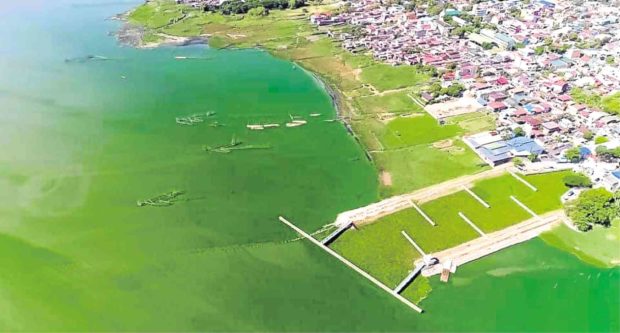Algae in Laguna de Bay not harmful despite smell

Credit to Author: besguerra| Date: Sun, 09 Jun 2019 21:04:40 +0000
MANILA, Philippines — The Muntinlupa City Health Office (CHO) has assured residents that the ongoing algal bloom in Laguna de Bay does not pose a threat to public health.
In an advisory, the city health office said the algae in the lake were filamentous freshwater green algae, also known as pond scum of the genus Spirogyra. These are not the harmful blue-green algae, which produce cyanotoxins (toxins from photosynthetic bacteria) that can make humans and animals sick.
Diarrhea, skin rashes, eye irritation, cough, sore throat and headache may be experienced if one swallows, breathes or comes into contact with water contaminated by toxins from blue-green algae. Most algae, however, pose no threat to humans.
Since last month, Muntinlupa City officials have been receiving complaints from residents and workers of establishments near Laguna de Bay about the foul odor coming from the lake. The smell has been described as “similar to the stench of pig pens and decaying fish.”
Stench spreading
The foul smell has reportedly spread to the farther areas of Northgate Business District in Barangay Alabang, around two kilometers from the lake shoreline.
Muntinlupa city information officer Tez Navarro said the local government recently created an interdepartment task force to spearhead the cleanup of Laguna de Bay.
Its members come from CHO, Lake Management Office (LMO), Environmental Sanitation Center, Environment Protection and Natural Resources Office, Office of the Mayor and other environmental agencies.
Navarro recommended that affected residents wear face masks, especially if they suffer from respiratory illnesses such as asthma, and to seek medical help in cases of difficulty in breathing.
According to CHO, the Spirogyra algae — locally called “lumot” or “liya” — appear in the lake during summer when the water level goes down.
When liya reaches the lakeshore, however, it dries up and emits a stench.
“The presence of liya in Laguna de Bay is a natural part of the aquatic ecosystem and is not a threat to public health unlike the impact of blue-green algae,” it said.
Algal bloom takes place in higher water temperatures (above 30 degrees Celsius). The situation in the lake was further worsened by the summer heat.
In a 2015 report by the city’s LMO, it explained that the presence of liya was “beneficial … as it is a natural food of the fish” in Laguna de Bay, which Muntinlupa City shares with Taguig and Pasig, along with Rizal and Laguna provinces.
The stench from dried-up liya, however, may cause people to experience difficulty in breathing and stomach aches, even trigger asthma attacks and respiratory tract infection.
Water service interruptions
Algal bloom has also resulted in water service interruptions since April for customers of Maynilad Water Services Inc. in the western portion of Metro Manila and parts of Cavite province.
Maynilad has two water treatment facilities on Laguna de Bay—Putatan water treatment facilities 1 and 2 — which have a combined maximum capacity of 250 million liters per day. Production has gone down because of the algae problem.
As a long-term solution, Maynilad proposed to build a polder — a low-lying tract of reclaimed land enclosed by dikes — on the bay. The idea, however, was rejected by the Laguna Lake Development Authority last year.